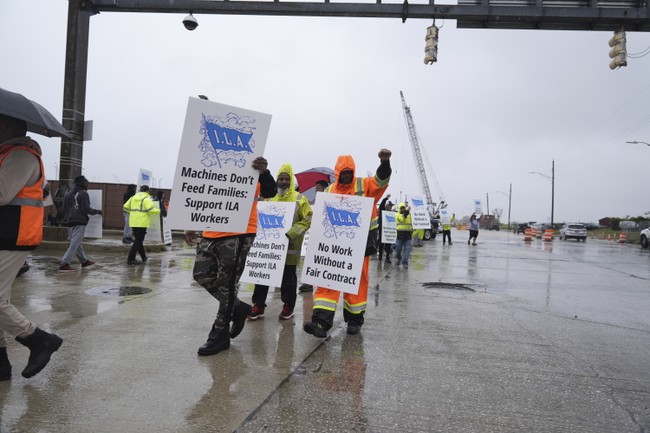
The United States Maritime Alliance (USMX) and the International Longshoremen’s Association (ILA) have gone on strike, shutting down the United States Atlantic and Gulf of Mexico ports, an act that will have lasting negative effects on the nation’s economy. This strike, the first by these unions in 50 years, comes a month before a general election – and Democratic Party presidential candidate Kamala Harris has embraced the strikers, which places the Democrat Party in the position of owning the economic fallout.
That’s not a good move – but it might be the October Surprise that sees Donald Trump return to the White House.
Vice President Harris voiced her support Wednesday for striking port workers, while also bashing her rival former President Trump, after tens of thousands of longshoremen at ports along the East Coast and Gulf of Mexico walked off the job.
“This strike is about fairness. Foreign-owned shipping companies have made record profits and executive compensation has grown. The Longshoremen, who play a vital role transporting essential goods across America, deserve a fair share of these record profits,” Harris said in a statement.
She quickly turned to Trump, saying he “wants to pull us back to a time before workers had the freedom to organize,” arguing that he makes “empty promises” to workers but “never delivers.”
Trump has never made any such statement, of course, but Kamala Harris has never been one to let reality get in the way of a good political attack. In point of fact, Kamala Harris isn’t one to let reality get in the way of, well, anything.
Here’s the problem with her embracing the strikers: She now owns, whether fairly or unfairly, all of the economic fallout of this strike. All of the rising prices, all of the empty store shelves, all of the layoffs due to supply chain disruptions; she owns it all. She has chosen this, and in a month she may well learn that when you dine at the devil’s table, you don’t get to choose the menu. And it’s not just commodities that will be affected; if this strike drags on, there are indicators that it will affect the energy sector, too.
The Department of Energy (DOE) issued a statement after the strike began saying the shutdown of the 36 East and Gulf Coast ports “will not impact crude oil, gasoline, natural gas, and other liquid fuel exports and imports, as such operations are handled by other workers. Therefore, the strike will not have any immediate impact on fuel supplies or prices.”
However, at least one energy sector expert disagrees:
In response to the DOE’s statement, oil and gas expert Adam Ferrari, CEO of Phoenix Capital Group, told FOX Business, “While you can say there might not be an ‘immediate’ impact, there is still the consideration of the overall economic hit the U.S. will take across all industries, including the oil and gas industry.”
And:
“This is a domino effect,” Ferrari said. “Increased gas prices could also lead to fluctuations in stock prices and investor and market uncertainty. In turn, it could also impact government regulation and policies, of which already have existing tensions within this sector.”
Granted demand may be affected as well; ships that aren’t moving don’t burn fuel. Energy costs, though, affect the economy from top to bottom; everything that moves is moved by trains, trucks, and airplanes that are heavily, if not completely, reliant on gas and oil to run them. President Biden has already tapped the nation’s Strategic Petroleum Reserve nearly dry to prop up his sagging poll numbers over gas prices, meanwhile clamping down on domestic production; we don’t have a lot to fall back on.
Also: Since the vice president is so concerned about record profits, how about the leader of the unions who are now striking? International Longshoremen’s Association leader Harold J. Daggett is sure finding this gig profitable:
The outspoken union leader behind gridlock at America’s East and Gulf Coast ports took home more than $900,000 last year, between a combined $728,000 salary from the International Longshoremen’s Association (ILA) and another $173,000 from ILA Local 1804-1 in North Bergen, New Jersey, data shows.
ILA President Harold J. Daggett remains at the center of discussion over the port strike that threatens to wound the U.S. economy with shortages and price hikes if not resolved soon.
That’s not a good look, not when people are having trouble meeting their monthly grocery bills. It’s hard to feel much sympathy for a union boss bringing in damn near a billion a year when you just had a mayonnaise sandwich for lunch.
Previously on RedState: Trump Hammers Harris-Biden for Port Strike—Their ‘Massive Inflation’ Caused It
WATCH: As Dockworkers Go on Strike, Union Negotiator Boldly Threatens to ‘Cripple’ the US Economy
We can, and do, hope this mess resolves quickly, and that the economic impact will be minimal. Elections aside, there is nothing about this strike that is good for the American people or the American economy. But if this drags on into November, the Trump/Vance campaign will no doubt hang the strike, and the vice president’s support for the strikers, around the neck of the Harris/Walz campaign like an albatross.
This may well be the October Surprise the Trump team has been hoping for.
